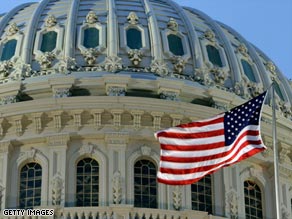Roland Burris, the man picked by embattled Ill. Gov. Rod Blagojevich to take President-elect Barack Obama's seat, appears today to be moving closer to winning an unusual showdown with Senate Democratic leaders.
A day after Burris's attempt to join the Senate was rejected by the chamber, Sen. Majority Leader Harry Reid (D-Nev). said Senate leaders are waiting for a ruling from the Illinois Supreme Court on whether the Illinois secretary of state must certify Burris's appointment by signing a document that is transmitted to the Senate. He suggested that decision could come as early as today or tomorrow and that the Senate would move quickly on a decision after that.
Reid, softening his tough rhetoric about not seating Burris and offering very warm praise for him after meeting the former Illinois attorney general for the first time this morning, said he hoped a decision could "come sooner rather than later."
Earlier this morning, House Majority Whip Rep. James Clyburn (D-S.C.), one of the most influential black members of Congress, said "I think he will be seated" on MSNBC's Morning Joe.
Senate Democrats, once sharply opposed to allowing Burris to be seated because he was appointed by Blagojevich (D), are considering allowing him to serve as a way to end a confrontation that could drag on for weeks and distract from what they hope will be an end to a decade of gridlock on Capitol Hill. One idea being considered, Democratic officials said yesterday, is allowing Burris to be seated if he agrees not to run for election in 2010, allowing the party to recruit another candidate to defend the seat (Burris has lost multiple statewide races in Illinois).
Two of the most prominent African Americans in the House -- Clyburn and Rep. Jesse L. Jackson Jr. (D-Ill.), who had aspired to the Senate seat -- both said yesterday that they think the law stands behind Burris, who would replace Obama as the only African American member of the Senate. Sen. Dianne Feinstein (D-Calif.) broke ranks to back Burris yesterday afternoon.
In a news conference this morning, Obama said he would accept Burris as his replacement in the Senate.
"This is a Senate matter. But I know Roland Burris, obviously; he's from my home state. I think he's a fine public servant. If he gets seated then I'm going to work with Roland Burris, just like I work with all the other senators," Obama said at a press conference at his transition headquarters.
Burris, 71 and a former state attorney general, had pressed his case yesterday at the Senate over the objections of Democrats there and Obama. Once formally rejected, he found himself holding a news conference on the lawn outside the Capitol just minutes before new senators were sworn in. The man who has already had his own mausoleum constructed in Illinois showed no signs of backing down.
"He thinks he's got a shot, and he's an ambitious guy with a large ego," Don Rose, a political consultant in Chicago who has known Burris since the 1960s, said yesterday. "I'm not sure that separates him from anybody in the Senate. . . . He's paid a lot of dues, and he may feel he's paid his dues."
Despite being selected by Blagojevich, who is under investigation on corruption charges that include allegations that he sought to sell Obama's Senate seat to the highest bidder, Burris has said in recent days that he will accept no compromise that would limit his rights as a senator. He called his appointment "what the Lord has ordained," and his visit to the Capitol suggested Burris would let nothing stop him from adding "U.S. senator" to the list of accomplishments on his mausoleum in Chicago.
But Burris shunned confrontation, despite the impasse over the seat. He left after his meeting with Reid and Durbin quietly, without talking to reporters. Yesterday, with several advisers in tow, including former Baltimore mayor Kurt L. Schmoke, Burris was denied the privileges given to senators and was required to go through a metal detector at the visitors' entrance to the Capitol. The senator-designate hugged the man in charge of making sure he would not enter the Senate chamber, Sergeant-at-Arms Terrance W. Gainer, whom he has known for years from their mutual time in Illinois politics.
'Politics' 카테고리의 다른 글
| Inauguration (0) | 2009.01.21 |
|---|---|
| Obama Takes Charge (0) | 2009.01.21 |
| Biden to be working families czar (0) | 2008.12.22 |
| Chief: Gov. Palin's home church damaged by arson (0) | 2008.12.14 |
| Commentary: Let Michelle Obama's real self shine (0) | 2008.12.12 |





